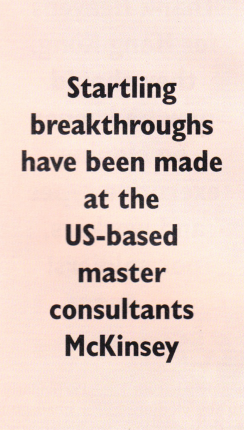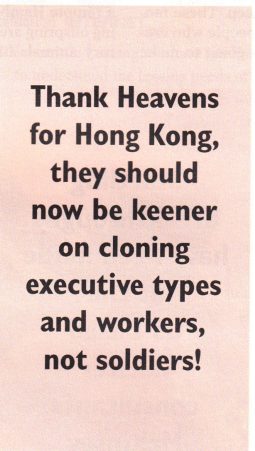Arthur Hadley
It was a sensation worldwide when it happened and it had its fallout on Sri Lanka too. A Scottish scientist made a breakthrough when he cloned a perfectly good sheep. Who could forget that historic moment? “Watson! Come here I need more mint jelly!’ said the Scottish scientist because that, I believe was one of the ingredients that went into the making of the magic sheep. These momentous discoveries aren’t about the people who create them, its about history and who’s going to make the most of it.
It’s a far cry from becoming even the beginning of history for us here in Sri Lanka. Across the seas and today’s world and skies, a whole new world of commercial possibility has yawned wide and shown its teeth. And naturally-as if nature had anything to do with it. Forward thinking companies were rushing in to this vat of opportunities. Yes, even as we keep at our scrawling, bold visionaries, the business world is developing products that will benefit humanity in the long run while generating significant cash flow in the near and intermediate terms.
A number of intriguing and imaginative possibilities have cropped up in this field abroad. There was that industrial outfit called Ovenious Industries whose fold was quick to cash in and patent a process that will produce replicated sheep to use as medieval business executives. It was noticed far back as 1957 by social scientists working with business advisors that the average middle manager came with drawbacks inherent in his (or, increasingly her) genetic human structure. Also as totally human middle managers aged, their hair often got thin and difficult to shear.
Now the same procedure that brought the world, outright cloning of tender, juicy farm animals, have been brought to bear to infuse human beings with characteristics that will ensure their business success. Let us come off it before we get any further. Here

in Sri Lanka we can only talk, think and let our imaginations run riot only focused on goats – both political and business, and price ones at that! And how does one get about manufacturing them? Here’s one scenario for the method in a Sri Lankan context. In an incredible operation, a human egg-white implanted with several poached yolks livestock bred in a remote Hambantota or Batticaloa farm. The resulting offspring are docile under attack from other predatory animals like leopards and investment bankers, calm to the point of entropy in long term business meetings and willing to eat all kinds of grass and devour quantities of paper written or unwritten except those which have a flavor of Goat’s flesh coming off them, for which they have an understandable aversion. The entropy spoken above is the measure of the unavailability of a systems thermal energy for conversion to mechanical work, or measure of the degradation of the universe (here read business). In Sri Lanka the latter applies more aptly than the former, both in business and politics.
Even more exciting are the possibilities that can emerge from experiments under way to develop the same process using genetic materiel from pigs, sharks, lions, rhinoceros, wild buffalo and weasels the small, nimble, slender- bodied, ferocious, carnivorous quadrupeds which it is hoped. will be suitable in the cloning of more senior management and politicos involved in big business.
At the same time startling breakthroughs have been made at the US-based master consultants McKinsey, who have reportedly developed a consistent stream of young, slender, handsome analysts, each very much like the other, all superbly grounded in the business implications of-well, just about everything you might care to name. Not that Sri Lanka doesn’t have the stereotype for consultants by the file- full. They are those who have generally gone into hibernation from long stints with JDBS and so on, or planter types now tending their lawns and back gardens ready to be consulted on anything provided it brings in the right remuneration. My friend Eardly Abeyesekera is the perfect example of the man who is consulted by top government corporations in the personal management area although his forte was in the tea trade. The essential characteristics of such stereotypes we have in plenty to make copies from, but they have come to where they are today only through a natural selection process in their organizations.
Now we hear of something different, again from the United States of America. As was widely reported, sometime in 1992, in a secret laboratory in Cleveland, a shaving from the attaches case of a bright young consultant was brewed up into not one but four separate fetuses, each of which was immediately subjected to radical incubation and brewed into full twenty-something status. Tragically, all of them, when capable of speech, recommended the immediate dismantling of the laboratory in which they were born and its sub- sequent relocation to dectralised posts accessible only to those willing to fly the American Eagle or take up with the World Bank and the IMF and this included Sri Lanka. This was probably the best thing from an American angle, no question of it, but much of the initial information on the discovery has therefore been lost.
Also intriguing are tit-bits of data that have been coming in from Japan where a joint venture of four technology companies is said to be developing clones of existing workers who will be willing to serve not just for one but several lifetimes, often without a decent dinner. Just imagine what its going to be like when China gets into the cloning game. Thank Heavens for Hong Kong, they should now be keener on cloning executive types and workers, not soldiers!
But for those of us who tend to view world events and say, ‘What’s in it for me?’ attention must be paid to the work of another US company Clone Us Generworx a fledgling upstart that promises the chance to invest in a personal clone. Ideal for application in business and in government in this country I tell you. Think about it: complete ownership of an alternate self until that entity either reaches the age of 35 or expresses the intention of cloning itself, whichever comes first; total access to another individual with your genetic framework to attend excru

ciating budget reviews, meet former business associates who want jobs, conduct performance reviews with the emotionally needy but unpromotable subordinates, and live out all the otherwise distasteful portions of one’s business existence confident that the person representing your point of view in these exchanges is someone whose DNA, Identity card, EPF number and shoe size are the same as yours; a bright and articulate person whom you can take out for a drink at the InterContinental’s new ‘Underground’ watching the ships across the sea outside the Colombo harbor while others are sipping lemonades, ginger beers or fruit juices; sneak out of your tidy little ties and businessman’s suit when you can’t take it one minute longer, think out loud and not wonder what he’s thinking because he’s you.
I don’t know about you, but I’m simply awaiting the day when we’ll have a chance to have such a goaty type, an alter ego, to work along with. I can’t wait to get him to work on my strategic plan presentation.
I know when he arrives I’m going to feel a little guilty, though ordering him around all the time, telling him like my wife does to our untrained new servant at home where she can sleep, what to eat, and like me to my subordinates which meetings to attend (and always the wrong ones, with too many key issues and no cold drinks). These feelings are sure to trouble a great many of us in a future filled with replicants. Fortunately, work is being done at the very moment by people who want to make sure that the philosophical framework of post-cloning society does not lag behind the practical implications.
Particularly promising are the results coming out of a small group of human resources professionals working on the ethical implications of cloning. These folk seem to be basing their arguments on a solid, traditional footing, including the debt owed by the clone for the gift of life, the duty of the clone to repay years of nurturing and guidance, the utilization of guilt when the clone refuses to recognize the honor of repaying the debt. In all fairness, or so the thinking goes, did you not give the clone the flesh off your back, feed it, water it, teach it right from wrong, give it a roof over its head, even offer it a head start in the world of business? Does it write? Does it drop by when it’s in town to visit its no-good clone friends? Boy, it will sure take one strong clone to stand up to those arguments. After all, it’s only human.


